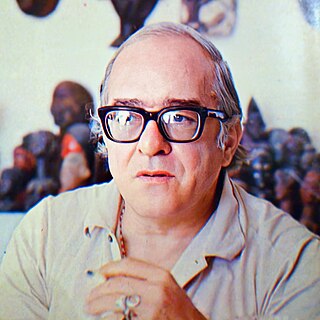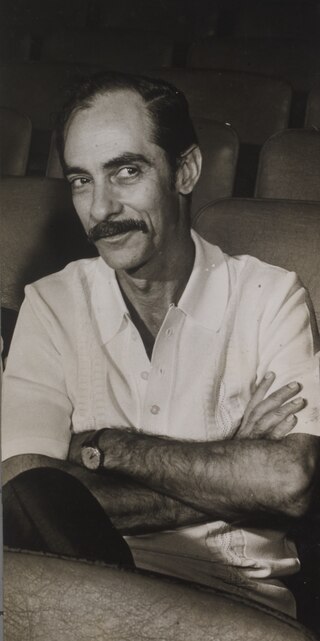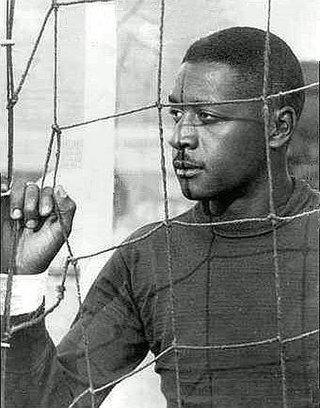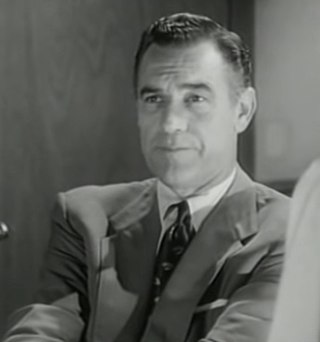A list of films produced in Brazil in 1950:
A list of films produced in Brazil in 1950:

Brazil, officially the Federative Republic of Brazil, is the largest and easternmost country in South America and Latin America. Brazil is the world's fifth-largest country by area and the seventh most populous. Its capital is Brasília, and its most populous city is São Paulo. Brazil is a federation composed of 26 states and a Federal District. It is the only country in the Americas where Portuguese is an official language. Brazil is among the world's most multicultural and ethnically diverse nations, due to over a century of mass immigration from around the world.

Franklin James Schaffner was an American film, television, and stage director. He won the Academy Award for Best Director for Patton (1970), and is known for the films Planet of the Apes (1968), Nicholas and Alexandra (1971), Papillon (1973), and The Boys from Brazil (1978). He served as president of the Directors Guild of America between 1987 and 1989.

Maria do Carmo Miranda da Cunha, known professionally as Carmen Miranda, was a Portuguese-born Brazilian singer, dancer, and actress. Nicknamed "The Brazilian Bombshell", she was known for her signature fruit hat outfit that she wore in her American films.

The 1950 FIFA World Cup was the fourth edition of the FIFA World Cup, the quadrennial international football championship for senior men's national teams. it was held in Brazil from 24 June to 16 July 1950. It was the first World Cup tournament in over twelve years, as the 1942 and 1946 World Cups were cancelled due to World War II. Italy, the two-time defending champions, were eliminated in the first round for the first time in history. Uruguay, who had won the inaugural competition in 1930, defeated the host nation, Brazil, in the deciding match of the four-team group of the final round. This was the only tournament not decided by a one-match final. It was also the inaugural tournament where the trophy was referred to as the Jules Rimet Cup, to mark the 25th anniversary of Jules Rimet's presidency of FIFA.

The Brazil national football team, nicknamed Seleção Canarinho, represents Brazil in men's international football and is administered by the Brazilian Football Confederation (CBF), the governing body for football in Brazil. They have been a member of FIFA since 1923 and a member of CONMEBOL since 1916.

Maracanã Stadium, officially named Jornalist Mário FilhoStadium, is an association football stadium in Rio de Janeiro, Brazil. The stadium is part of a complex that includes an arena known by the name of Maracanãzinho, which means "The Little Maracanã" in Portuguese. Owned by the Rio de Janeiro state government, the stadium is now managed by the clubs Fluminense and Flamengo. It is located in the Maracanã neighborhood, named after the Rio Maracanã, a now canalized river in Rio de Janeiro.

Marcus Vinícius da Cruz e Mello Moraes, better known as Vinícius de Moraes and nicknamed O Poetinha, was a Brazilian poet, diplomat, lyricist, essayist, musician, singer, and playwright. With his frequent and diverse musical partners, including Antônio Carlos Jobim, his lyrics and compositions were instrumental in the birth and introduction to the world of bossa nova music. He recorded numerous albums, many in collaboration with noted artists, and also served as a successful Brazilian career diplomat.

Sônia Maria Campos Braga is a Brazilian actress. She is known in the English-speaking world for her Golden Globe Award–nominated performances in Kiss of the Spider Woman (1985) and Moon over Parador (1988). She also received a BAFTA Award nomination in 1981 for Dona Flor and Her Two Husbands. For the 1994 television film The Burning Season, she was nominated for an Emmy Award and a third Golden Globe Award. Her other television and film credits include The Cosby Show (1986), Sex and the City (2001), American Family (2002), Alias (2005), Aquarius (2016), Bacurau (2019), and Fatima (2020). In 2020, The New York Times ranked her #24 in its list of the 25 Greatest Actors of the 21st Century.
United International Pictures (UIP) is a joint venture of Paramount Pictures and Universal Pictures that distributes their films outside the United States and Canada. UIP also had international distribution rights to certain Metro-Goldwyn-Mayer (MGM) and United Artists (UA) films when MGM was part of the venture and also distributed Disney films in certain territories until 1987. In 2001, MGM left UIP, and signed a distribution deal with 20th Century Fox's overseas arm. The company formerly distributed DreamWorks Pictures releases internationally as well until late 2005.

The match between Uruguay and Brazil was the decisive match of the final stage at the 1950 FIFA World Cup. It was played at the Maracanã Stadium in the then-capital of Brazil, Rio de Janeiro, on 16 July 1950.

Alcides Edgardo Ghiggia Pereyra was a Uruguayan-Italian football player, who played as a right winger. He achieved lasting fame for his decisive role in the final match of the 1950 World Cup, and at the time of his death exactly 65 years later, he was also the last surviving player of the Uruguay squad at the 1950 World Cup.

Alfredo de Freitas Dias Gomes was a Brazilian playwright.

Moacir Barbosa do Nascimento was a Brazilian professional footballer who played as a goalkeeper. His career spanned 22 years. He was regarded as one of the world's best goalkeepers in the 1940s and 1950s, and was known for not wearing gloves, as would be typical. Barbosa is mainly associated with Brazil's defeat against underdogs Uruguay in the decisive match of the 1950 FIFA World Cup, an upset dubbed the Maracanazo.

Alberto de Almeida Cavalcanti was a Brazilian-born film director and producer. He was often credited under the single name "Cavalcanti".

Rede Tupi was a Brazilian commercial terrestrial television network. Its flagship station, located in the city of São Paulo, was the first TV station to operate in the country, being inaugurated on 18 September 1950 by journalist Assis Chateaubriand. It was owned by Diários Associados, one of the largest media conglomerates of the 20th century, owner of several newspapers, magazines, and radio stations.
Anselmo Duarte Bento was a Brazilian actor, screenwriter and film director.

Leonardo Villar was a Brazilian actor. He became internationally known for his performance as Zé do Burro in Anselmo Duarte's O Pagador de Promessas, the only Brazilian film so far awarded a Palme d'Or at the Cannes Film Festival.
Mario Pretto was an Italian footballer turned coach who managed Bolivia in the 1950 FIFA World Cup.

Stuart Randall was an American band leader, singer, live theater actor, and actor of film and television who appeared on screen between 1950 and 1971.

Events in the year 1950 in Brazil.